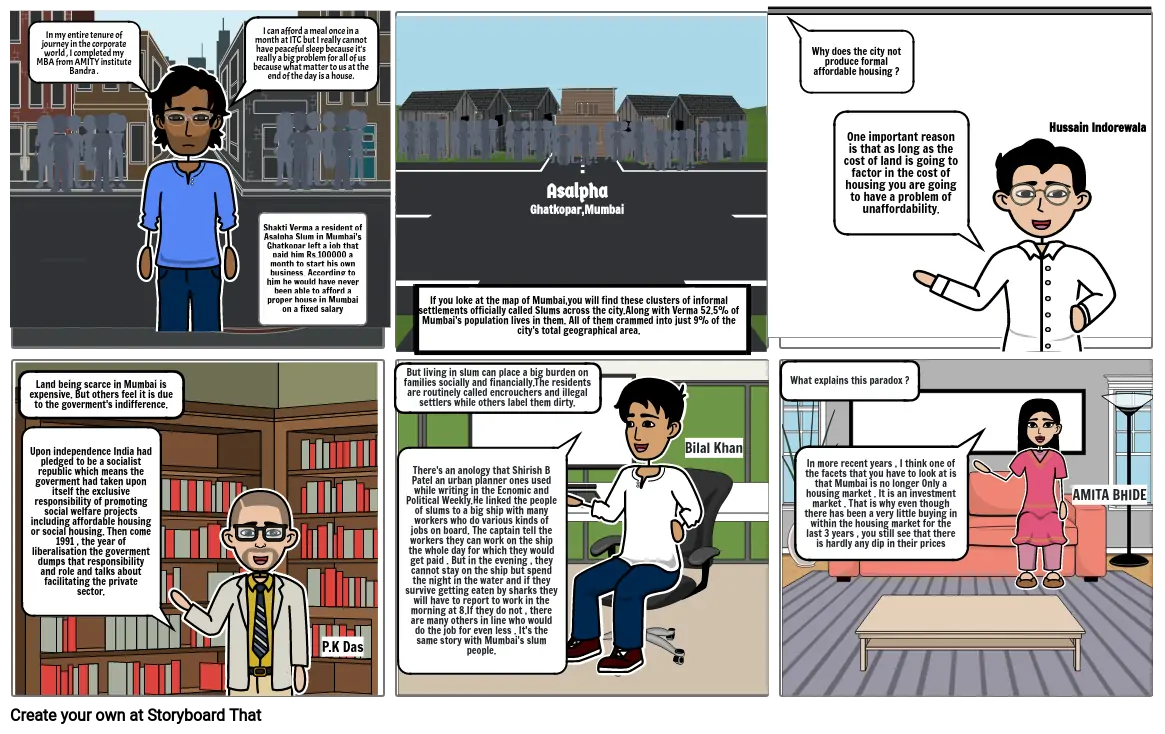COMPSTAR 2022

Storyboard Text
- In my entire tenure of journey in the corporate world , I completed my MBA from AMITY institute Bandra .
- I can afford a meal once in a month at ITC but I really cannot have peaceful sleep because it's really a big problem for all of us because what matter to us at the end of the day is a house.
- Shakti Verma a resident of Asalpha Slum in Mumbai's Ghatkopar left a job that paid him Rs.100000 a month to start his own business. According to him he would have never been able to afford a proper house in Mumbai on a fixed salary
- AsalphaGhatkopar,Mumbai
- If you loke at the map of Mumbai,you will find these clusters of informal settlements officially called Slums across the city.Along with Verma 52.5% of Mumbai's population lives in them. All of them crammed into just 9% of the city's total geographical area.
-
- Why does the city not produce formal affordable housing ?
- One important reason is that as long as the cost of land is going to factor in the cost of housing you are going to have a problem of unaffordability.
- Hussain Indorewala
- Land being scarce in Mumbai is expensive. But others feel it is due to the goverment's indifference.
- Upon independence India had pledged to be a socialist republic which means the goverment had taken upon itself the exclusive responsibility of promoting social welfare projects including affordable housing or social housing. Then come 1991 , the year of liberalisation the goverment dumps that responsibility and role and talks about facilitating the private sector.
- P.K Das
- But living in slum can place a big burden on families socially and financially.The residents are routinely called encrouchers and illegal settlers while others label them dirty.
- There's an anology that Shirish B Patel an urban planner ones used while writing in the Ecnomic and Political Weekly.He linked the people of slums to a big ship with many workers who do various kinds of jobs on board. The captain tell the workers they can work on the ship the whole day for which they would get paid . But in the evening , they cannot stay on the ship but spend the night in the water and if they survive getting eaten by sharks they will have to report to work in the morning at 8.If they do not , there are many others in line who would do the job for even less . It's the same story with Mumbai's slum people.
- Bilal Khan
- What explains this paradox ?
- In more recent years , I think one of the facets that you have to look at is that Mumbai is no longer Only a housing market . It is an investment market . That is why even though there has been a very little buying in within the housing market for the last 3 years , you still see that there is hardly any dip in their prices
- AMITA BHIDE
Over 30 Million Storyboards Created
No Downloads, No Credit Card, and No Login Needed to Try!


